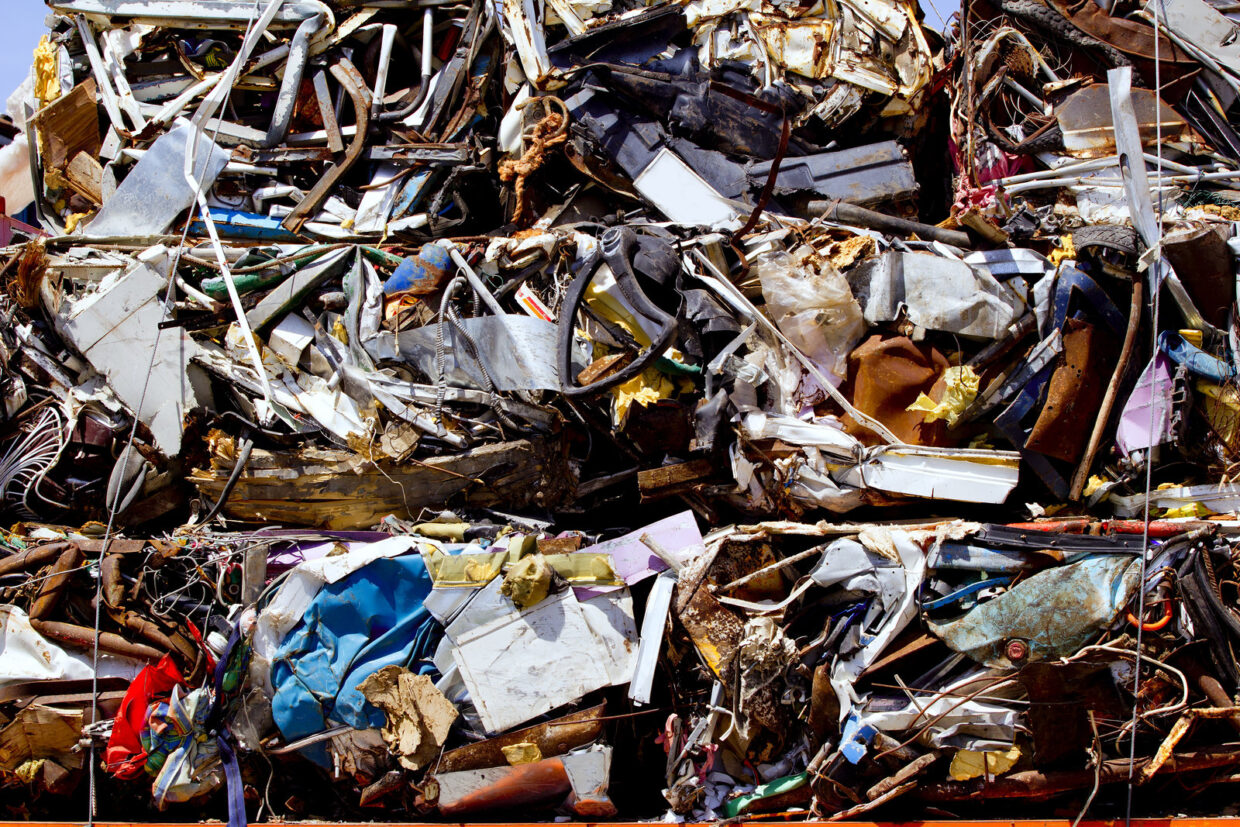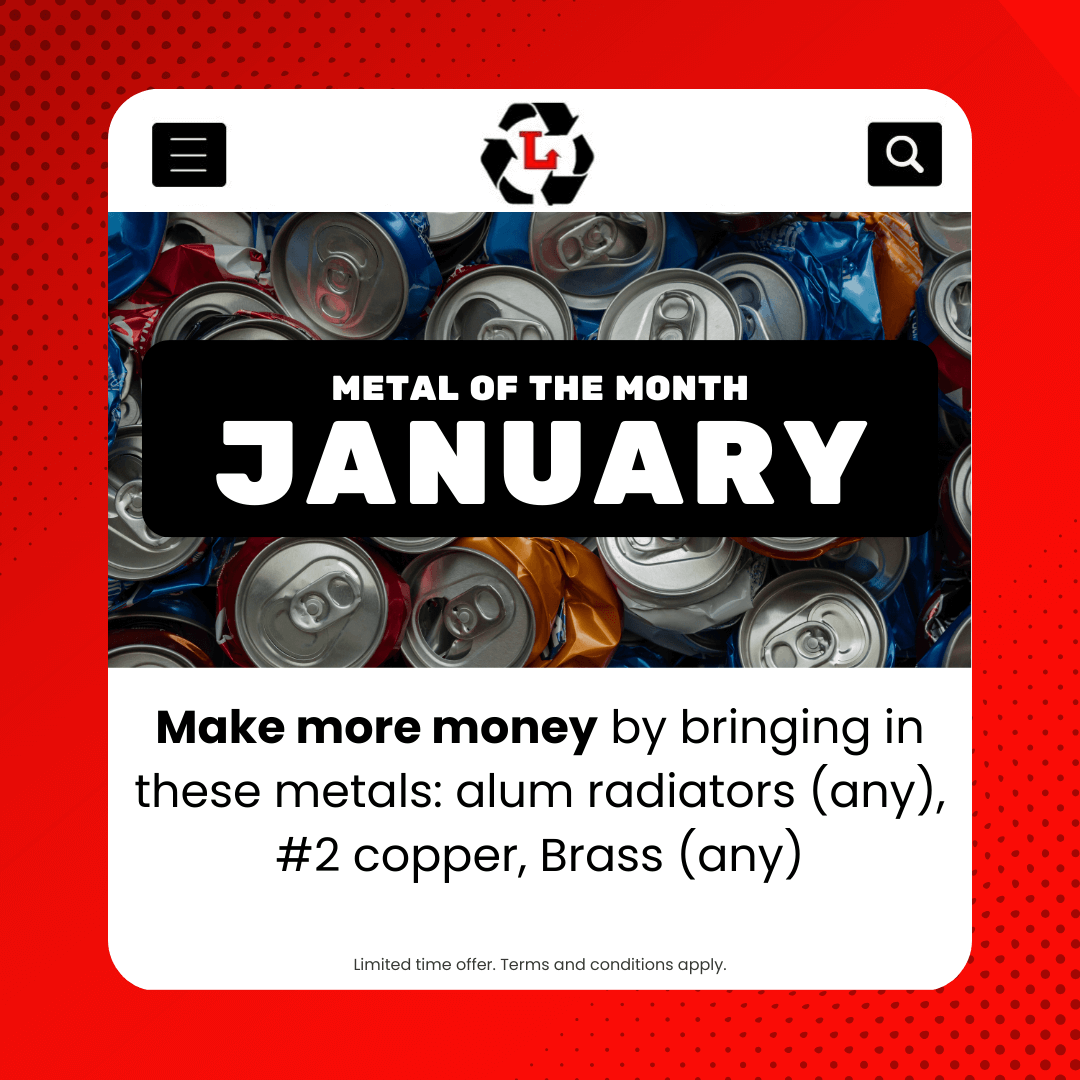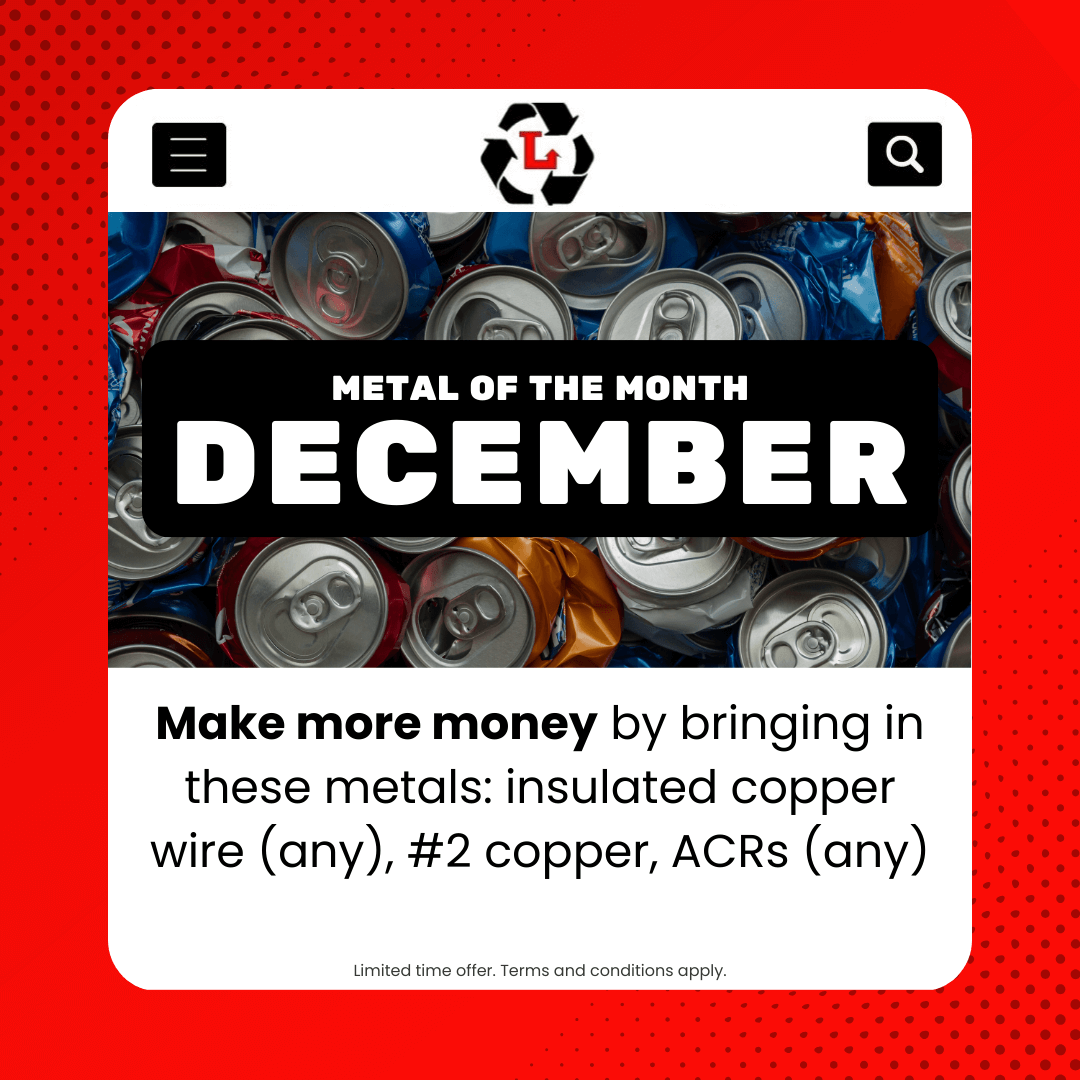Have you ever found yourself in a situation where you had metal items lying around but didn’t do anything with them because you weren’t sure they were recyclable or how to start recycling them?
It’s not strange since there are various scrap metal classifications, types, and grades, so it can be a bit overwhelming for someone just starting out to recycle.
Don’t worry—we have also been there. In fact, we came out with this guide to help everyone who is new to recycling metal because we know the struggle.
After reading this article, you will completely understand what scrap metal is, its different types, and examples of scrap metal you can recycle.
Let’s unpack this!
What Is Considered Scrap Metal?
Scrap metal is any used metal or metallic material that can’t be used anymore but can be recycled. So, anything from old appliances to car parts, old machinery and manufacturing scrap is considered scrap metal.
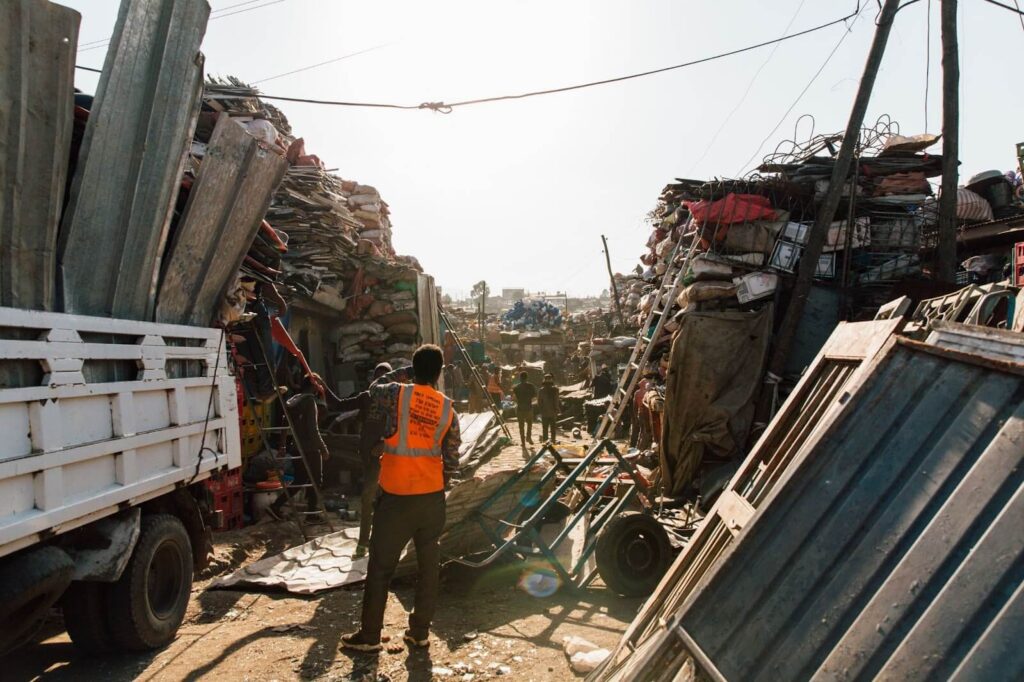
Why Recycling Scrap Metal?
Recycling scrap metal is a win-win activity. By recycling, we’re taking care of our planet and making a better environment for ourselves and our descendants. On top of that, scrap metal recycling is a huge industry, and you can make money from it.
When it comes to the price of scrap metal, it can really fluctuate based on global demand, supply, and economic conditions. For instance, the rise in inflation affected price changes in everything, and scrap metal is no exception.
If you want to know exactly how much money you will make from recycling, your local scrap metal recycler is the best source for accurate prices.
However, the main reason why everyone should recycle scrap metal is that this process produces new metal packaging (such as cans, aluminum foil, and aerosol cans, for example) and new metal products, which are more efficient and eco-friendly than always making new ones.
Now that you know what scrap metal is and why you should recycle it, let’s see the different types of scrap metal.
Types of Scrap Metal
The two main categories of scrap metal are ferrous and non-ferrous metals.
Ferrous Metals
The most prevalent class of recycled metals is ferrous metal—a type of scrap metal that contains iron and steel. Some examples of ferrous metals are alloy steel, carbon steel, cast iron, and wrought iron. This type of metal has a high carbon content, making it susceptible to rust or corrosion and quickly obsolete.
Iron
Iron is a silver-white metal that is known for its strength and durability. It is widely used in construction, transportation, machinery, and many other applications.
The iron atoms are indestructible, which means when you melt them, they arrange themselves in a new, regular way to form new steel with new properties. What this actually means is that iron can be endlessly recycled because its material qualities won’t be compromised.
Steel
Steel is an alloy made from iron and carbon, with carbon content typically ranging from 0.2% to 2.1%. It is usually used in a wide range of applications, from construction and infrastructure to transportation, machinery, and household appliances. Recycling steel is a highly efficient process, with over 70% of the steel in the U.S. coming from recycled materials, making it an essential part of the circular economy.
We can see how widely spread ferrous metals are from the fact that in 2021 the total value of domestic purchases in the U.S. of iron and steel scrap was estimated to be $27 billion, according to the United States Geological Survey.
Items you’re most likely to already have on hand that are in this category are refrigerators, ovens, cast iron skillets, automotive parts, pipes and plumbing fixtures, and many others.
Because of their high carbon content, ferrous metals are generally prone to rust or corrosion, making them obsolete quickly.
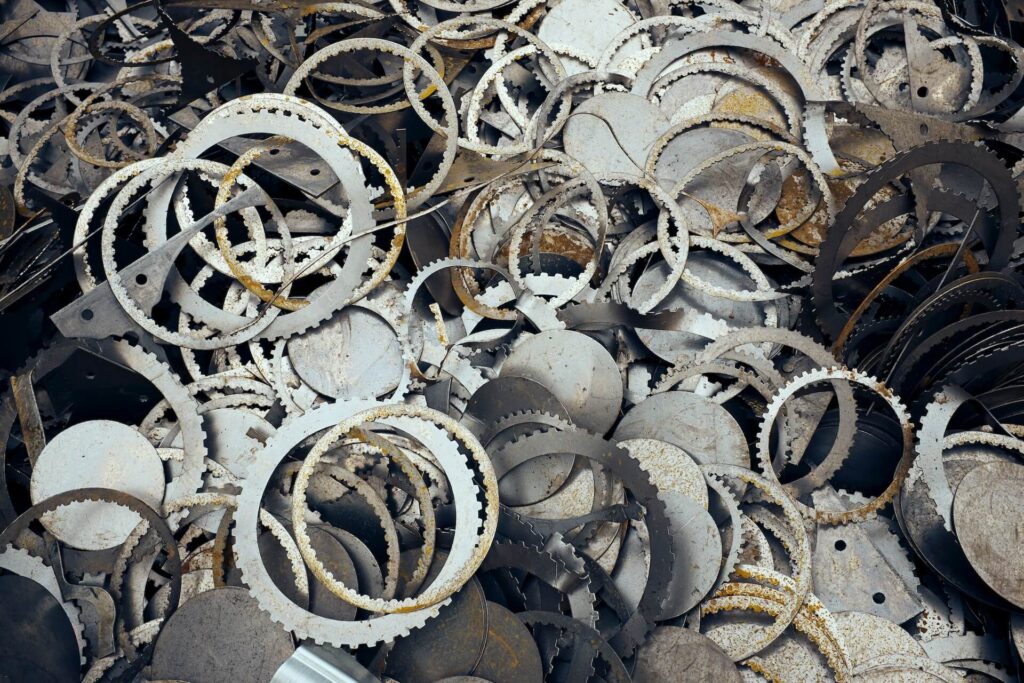
Non-ferrous Metals
On the other hand, we have non-ferrous metals—metals that don’t contain iron (or have a very small amount). This category is very loved and used because of its desirable properties like resistance to corrosion, lightweight, and malleability.
Here is a scrap material list of different non-ferrous metals:
Aluminum
Aluminum is one of the most commonly recycled scrap metals. Because of its lightweight and rust-resistance, it’s the perfect material for soda packaging. What’s most important is that used aluminum cans are typically recycled directly into new cans, repeating this process over and over again.
Copper
Copper is a reddish-brown metal used in electrical wiring, roofing materials, electronics, plumbing, and HVAC systems because of its excellent electrical and thermal conductivity, as well as its high conductivity and durability. Globally speaking, around 8.7 million tons of copper come from recycling each year.
Brass
Brass is an alloy made up of copper, zinc, and different amounts of other metals depending on specific applications. As with all other non-ferrous metals, brass has corrosion resistance, malleability, and decorative properties. Because of that, brass is often used for musical instruments, decorative hardware, and plumbing fixtures. Compared to producing new brass from virgin materials, recycling brass not only helps conserve natural resources but also reduces energy consumption and greenhouse gas emissions.
Nickel
Nickel is a hard, silvery-white metal from the non-ferrous category that is most commonly used in batteries and electronics production. Recycling nickel-containing batteries is extremely important because it prevents environmental pollution and conserves valuable resources. Moreover, recycled nickel can be used to create new batteries or other products.
Titanium
Titanium is strong but lightweight at the same time, making it ideal for the aerospace industry, medical implants, and sports equipment. The titanium recycling process is a bit more challenging and expensive than other materials, but very beneficial. Titanium can be infinitely recycled without losing any of its features or overall quality.
Zinc
Zinc is a bluish-white metal often used for coating iron and steel to prevent corrosion. Zinc is also used in the production of alloys, as well as in battery production, construction materials, and fertilizers. This metal is highly recyclable, with over 80% produced in the U.S. from recycled materials. Recycling zinc is more energy-efficient than making new zinc from virgin materials because recycling uses less energy.
How to Differ Ferrous And Non-ferrous Metals?
If you’re still unsure what metal your old items are made of—we’ve got your back!
You can do a simple test to determine if a specific item is made of ferrous or non-ferrous metal by checking if it is magnetic.
If your object is magnetic—it’s made of a ferrous metal! And if your thing is non-magnetic, then, of course, it is made of non-ferrous metal.
This easy test can be really handy when you want to sort your items into categories before taking them to recycle.

Examples of Scrap Metal
We’ve already explained each scrap metal type and its general use, but to make it even easier for you to know exactly what you can bring to recycling—we’ve prepared a scrap metal list with different items you probably already have at home and can recycle.
- Kitchen appliances — Most of our kitchen appliances are made of ferrous materials. Next time you buy a new refrigerator, microwave, oven, or dishwasher, make sure to scrap the old ones.
- Pots and pans — Speaking of the kitchen, pots, and pans made of aluminum or cast iron are something we often buy, and instead of throwing old ones in the trash, next time, you will know that you can recycle them.
- Sinks and faucets — Sinks and faucets are most commonly made of brass and stainless steel, which makes them perfectly suitable for recycling. By recycling them, you’ll reduce the contribution to landfill waste. If you choose a more efficient faucet—you will also take a significant step toward conserving water use in your home.
- Copper piping and tubes — these items and anything with copper, you can take to a scrap metal place and earn some money while also feeling relief because of decluttering your house, garage, or workplace.
- Insulated copper wire — How many old or broken charges do you have in the dark corners of your home? Our bet is—at least two! Are we right?
- Many people are not sure what to do with them, but the answer is really simple—collect all of your cables and chargers and take them into recycling.
- Automotive parts — Old car parts or cars, in general, are a huge category of items that can be recycled. We have a few tips for you to ensure the scrap metal recycler will accept your automotive parts because it can be a bit tricky:
- You need to drain the car of all fluids before taking it into scrap.
- You must separate and categorize the ferrous and non-ferrous parts as much as possible. (Do you remember our simple test from above? Check it again if you’re not sure how to know the difference.) The non-ferrous pieces will make you more money, but that won’t be the case if you scrap the whole car without categorization. Another piece of advice we have is to make your own scrap list so classification goes smoothly.
- You should only scrap the entire car if it certainly can’t be used anymore. Don’t expect to get rich by recycling your old car, but it’s way better than nothing or keeping it around, taking up space.
- Anything from aluminum — as we already mentioned, aluminum is the most recycled metal, and it’s because it’s so widely used. Anything from soda cans to sheet aluminum, car rims, kitchen appliances, etc., can be recycled.
- Jewelry and accessories — There is a high chance that you have only one earring because you lost the other one. Or, maybe you have a damaged necklace or bracelet that can’t be brought back to life. Luckily, all of that can be recycled. So, if you have earrings, necklaces, bracelets, money clips, cufflinks, rings, or other accessories you’re ready to say goodbye to, the best thing to do is to take them to the scrap yard.
Final Word
Congratulations—now you know all the necessary information to start recycling scrap metal!
We hope this article helped you better understand what is considered scrap metal, the differences, and which items you can start recycling today.
There is no reason not to declutter our space, earn some cash, and make our planet a better place to live. Every one of us can make a huge difference!
And if you have any doubts or questions about recycling scrap metal, feel free to contact us. We would like to help!
Happy scrapping!


